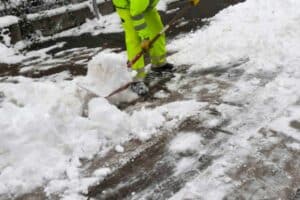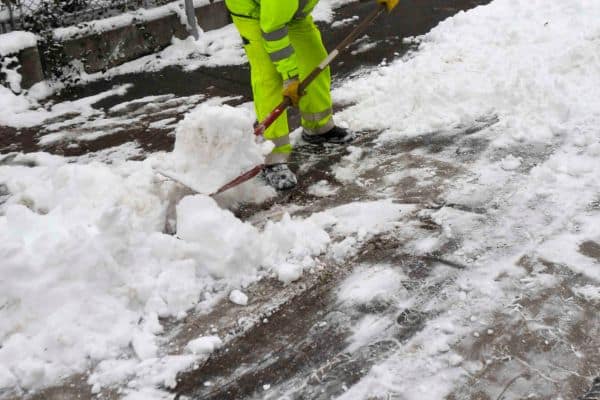
Slip and Fall Accidents
One of the most significant winter liability risks for businesses is slip and fall accidents. Accumulated snow and ice create hazardous conditions, increasing the likelihood of employees, customers, or visitors slipping and injuring themselves on your property.
Legal Responsibility
Businesses have a legal responsibility to maintain their premises in a safe condition, including during winter. Laws and regulations vary by location, but many municipalities and states require property owners to keep walkways, parking lots, and entrances clear of snow and ice to prevent accidents.
Potential Legal Consequences
If someone is injured due to a slip and fall on your property because of inadequate snow removal or ice management, your business could be held legally liable. This may result in costly lawsuits, settlements, and damage to your business’s reputation.
Insurance Implications
Inadequate snow removal can also have implications for your business insurance. Insurance providers may deny coverage or increase premiums if they determine that your negligence in snow removal contributed to an accident.
Timely Snow Removal is Key
To mitigate liability risks, it’s essential to promptly and effectively remove snow and ice from your property. This includes clearing walkways, parking areas, and entrances to ensure safe passage for pedestrians and vehicles.
Use of Professionals
Engaging professional snow removal services can be a wise investment. Professional snow removal companies have the equipment, expertise, and resources to respond quickly to changing weather conditions and ensure that your property remains safe and compliant with local regulations.
Monitoring Weather Conditions
Stay informed about weather forecasts and anticipated snowfall. Proactive planning and scheduling snow removal services ahead of time can help prevent accidents and potential legal issues.
Documentation
Maintain records of your snow removal efforts. This documentation can be valuable in case of legal disputes. Document the date and time of snow removal, the methods used, and any communication with snow removal service providers.
Communication with Tenants and Employees
Keep tenants, employees, and visitors informed about your snow removal procedures and expectations. Use signage to designate safe paths and areas that have been cleared or treated.
Review Contracts
If you outsource your snow removal services, review contracts carefully to understand the responsibilities and liabilities of both parties. Ensure that your service provider is adequately insured and licensed.
In conclusion, businesses face significant liability risks during the winter months, particularly concerning snow and ice removal. Understanding your legal responsibilities, promptly addressing snow removal, and engaging professional snow removal services are crucial steps to mitigate these risks. By proactively managing winter conditions on your property, you can enhance safety, protect your business from legal consequences, and maintain a positive reputation among customers and visitors.

